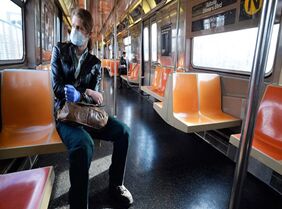针对新冠疫情的隔离措施可能要持续到2022年
|
Physical distancing measures may need to be in place intermittently until 2022, scientists have warned in an analysis that suggests there could be resurgences of Covid-19 for years to come. The paper, published in the journal Science, concludes that a one-time lockdown will not be sufficient to bring the pandemic under control and that secondary peaks could be larger than the current one without continued restrictions. One scenario predicted a resurgence could occur as far in the future as 2025 in the absence of a vaccine or effective treatment.
Marc Lipsitch, a professor of epidemiology at Harvard and co-author of the study, said: "Infections spread when there are two things: infected people and susceptible people. Unless there is some enormously larger amount of herd immunity than we're aware of ... the majority of the population is still susceptible. "Predicting the end of the pandemic in the summer [of 2020] is not consistent with what we know about the spread of infections." New treatments, a vaccine, or increasing critical care capacity could alleviate the need for stringent physical distancing, according to the paper. "But in the absence of these, surveillance and intermittent distancing may need to be maintained into 2022," the authors conclude. The overall numbers of cases in the next five years, and the level of distancing required, were found to depend crucially on the overall current levels of infection and whether all those who are infected gain immunity and, if so, for how long. The authors cautioned that these are big unknowns and that a precise prediction of the long-term dynamics is not possible. If immunity is permanent, Covid-19 could disappear for five or more years after the first outbreak, the paper suggests. If people have immunity for about a year, as is seen for some other circulating coronaviruses, an annual outbreak cycle would be the most likely outcome. Prof Marion Koopmans, the head of virology at the Erasmus University Medical Centre in Rotterdam, whose team is studying the antibody response of those infected, said complete and permanent protection would be unusual for a respiratory virus. "What you would expect to see – hope to see – is that people who have had it once ... the disease would get milder," she said before the latest paper was released. |









